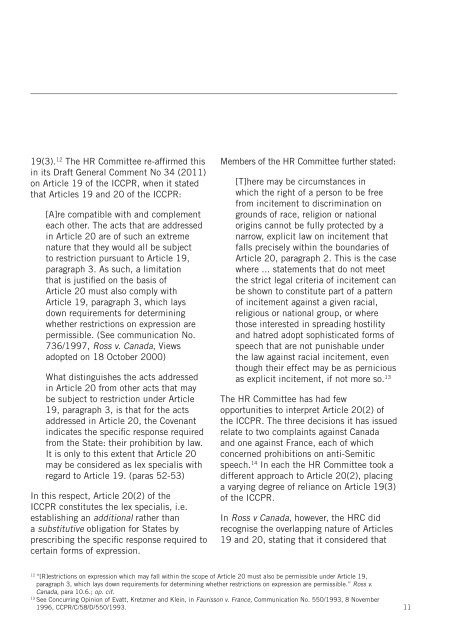ARTICLE-19-policy-on-prohibition-to-incitement
ARTICLE-19-policy-on-prohibition-to-incitement
ARTICLE-19-policy-on-prohibition-to-incitement
You also want an ePaper? Increase the reach of your titles
YUMPU automatically turns print PDFs into web optimized ePapers that Google loves.
<str<strong>on</strong>g>19</str<strong>on</strong>g>(3). 12 The HR Committee re-affirmed this<br />
in its Draft General Comment No 34 (2011)<br />
<strong>on</strong> Article <str<strong>on</strong>g>19</str<strong>on</strong>g> of the ICCPR, when it stated<br />
that Articles <str<strong>on</strong>g>19</str<strong>on</strong>g> and 20 of the ICCPR:<br />
[A]re compatible with and complement<br />
each other. The acts that are addressed<br />
in Article 20 are of such an extreme<br />
nature that they would all be subject<br />
<strong>to</strong> restricti<strong>on</strong> pursuant <strong>to</strong> Article <str<strong>on</strong>g>19</str<strong>on</strong>g>,<br />
paragraph 3. As such, a limitati<strong>on</strong><br />
that is justified <strong>on</strong> the basis of<br />
Article 20 must also comply with<br />
Article <str<strong>on</strong>g>19</str<strong>on</strong>g>, paragraph 3, which lays<br />
down requirements for determining<br />
whether restricti<strong>on</strong>s <strong>on</strong> expressi<strong>on</strong> are<br />
permissible. (See communicati<strong>on</strong> No.<br />
736/<str<strong>on</strong>g>19</str<strong>on</strong>g>97, Ross v. Canada, Views<br />
adopted <strong>on</strong> 18 Oc<strong>to</strong>ber 2000)<br />
What distinguishes the acts addressed<br />
in Article 20 from other acts that may<br />
be subject <strong>to</strong> restricti<strong>on</strong> under Article<br />
<str<strong>on</strong>g>19</str<strong>on</strong>g>, paragraph 3, is that for the acts<br />
addressed in Article 20, the Covenant<br />
indicates the specific resp<strong>on</strong>se required<br />
from the State: their prohibiti<strong>on</strong> by law.<br />
It is <strong>on</strong>ly <strong>to</strong> this extent that Article 20<br />
may be c<strong>on</strong>sidered as lex specialis with<br />
regard <strong>to</strong> Article <str<strong>on</strong>g>19</str<strong>on</strong>g>. (paras 52-53)<br />
In this respect, Article 20(2) of the<br />
ICCPR c<strong>on</strong>stitutes the lex specialis, i.e.<br />
establishing an additi<strong>on</strong>al rather than<br />
a substitutive obligati<strong>on</strong> for States by<br />
prescribing the specific resp<strong>on</strong>se required <strong>to</strong><br />
certain forms of expressi<strong>on</strong>.<br />
Members of the HR Committee further stated:<br />
[T]here may be circumstances in<br />
which the right of a pers<strong>on</strong> <strong>to</strong> be free<br />
from <strong>incitement</strong> <strong>to</strong> discriminati<strong>on</strong> <strong>on</strong><br />
grounds of race, religi<strong>on</strong> or nati<strong>on</strong>al<br />
origins cannot be fully protected by a<br />
narrow, explicit law <strong>on</strong> <strong>incitement</strong> that<br />
falls precisely within the boundaries of<br />
Article 20, paragraph 2. This is the case<br />
where ... statements that do not meet<br />
the strict legal criteria of <strong>incitement</strong> can<br />
be shown <strong>to</strong> c<strong>on</strong>stitute part of a pattern<br />
of <strong>incitement</strong> against a given racial,<br />
religious or nati<strong>on</strong>al group, or where<br />
those interested in spreading hostility<br />
and hatred adopt sophisticated forms of<br />
speech that are not punishable under<br />
the law against racial <strong>incitement</strong>, even<br />
though their effect may be as pernicious<br />
as explicit <strong>incitement</strong>, if not more so. 13<br />
The HR Committee has had few<br />
opportunities <strong>to</strong> interpret Article 20(2) of<br />
the ICCPR. The three decisi<strong>on</strong>s it has issued<br />
relate <strong>to</strong> two complaints against Canada<br />
and <strong>on</strong>e against France, each of which<br />
c<strong>on</strong>cerned prohibiti<strong>on</strong>s <strong>on</strong> anti-Semitic<br />
speech. 14 In each the HR Committee <strong>to</strong>ok a<br />
different approach <strong>to</strong> Article 20(2), placing<br />
a varying degree of reliance <strong>on</strong> Article <str<strong>on</strong>g>19</str<strong>on</strong>g>(3)<br />
of the ICCPR.<br />
In Ross v Canada, however, the HRC did<br />
recognise the overlapping nature of Articles<br />
<str<strong>on</strong>g>19</str<strong>on</strong>g> and 20, stating that it c<strong>on</strong>sidered that<br />
12<br />
“[R]estricti<strong>on</strong>s <strong>on</strong> expressi<strong>on</strong> which may fall within the scope of Article 20 must also be permissible under Article <str<strong>on</strong>g>19</str<strong>on</strong>g>,<br />
paragraph 3, which lays down requirements for determining whether restricti<strong>on</strong>s <strong>on</strong> expressi<strong>on</strong> are permissible.” Ross v.<br />
Canada, para 10.6.; op. cit.<br />
13<br />
See <br />
C<strong>on</strong>curring Opini<strong>on</strong> of Evatt, Kretzmer and Klein, in Fauriss<strong>on</strong> v. France, Communicati<strong>on</strong> No. 550/<str<strong>on</strong>g>19</str<strong>on</strong>g>93, 8 November<br />
<str<strong>on</strong>g>19</str<strong>on</strong>g>96, CCPR/C/58/D/550/<str<strong>on</strong>g>19</str<strong>on</strong>g>93.<br />
11


